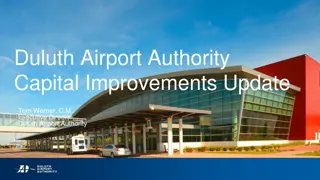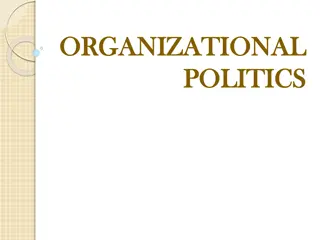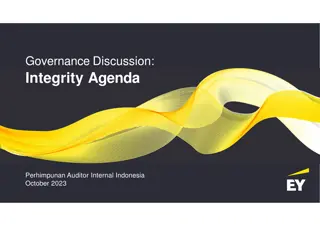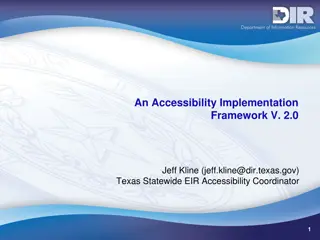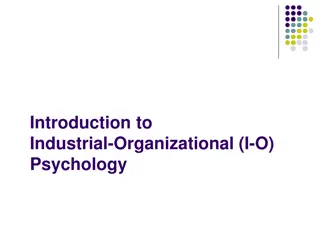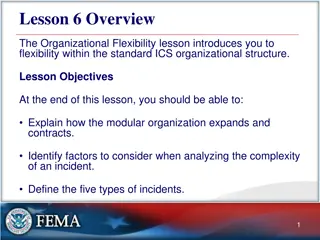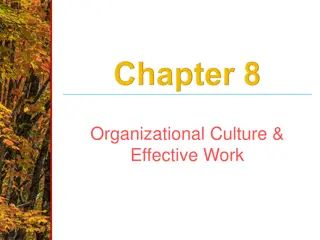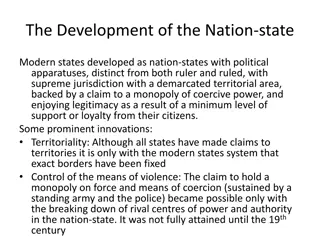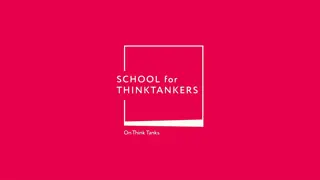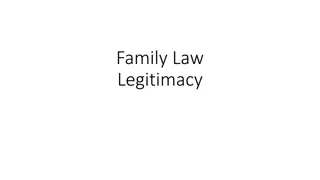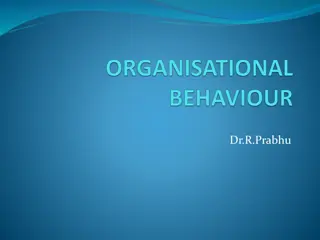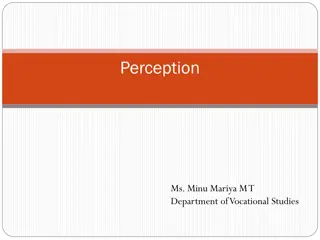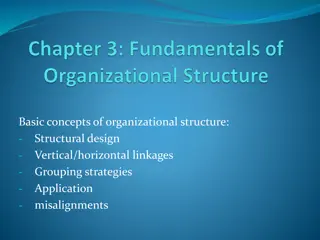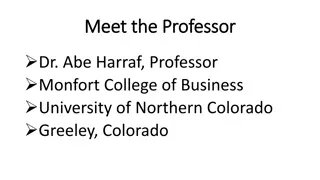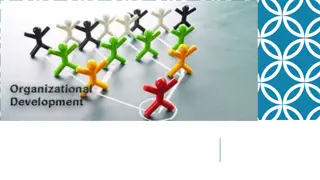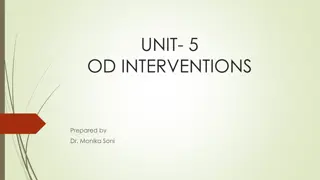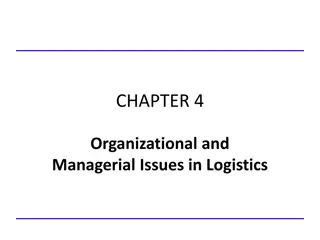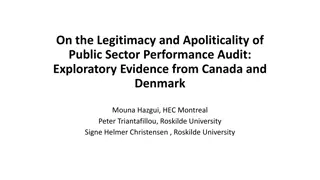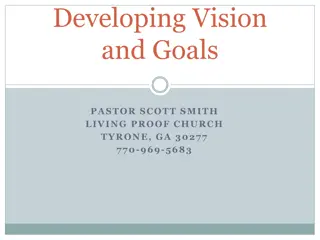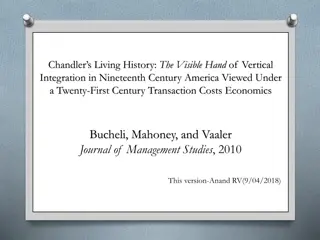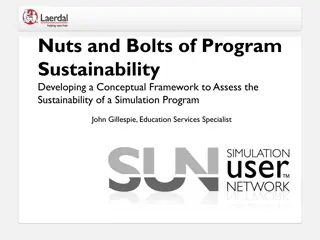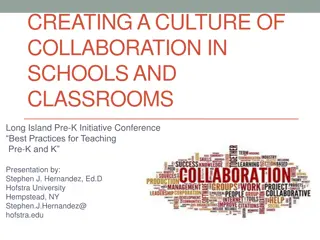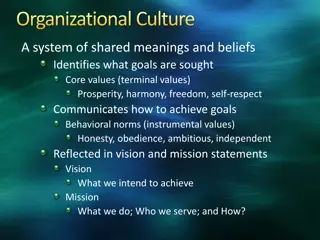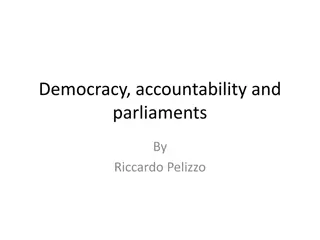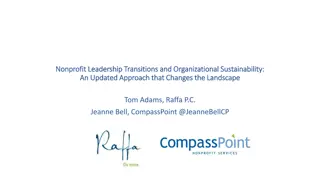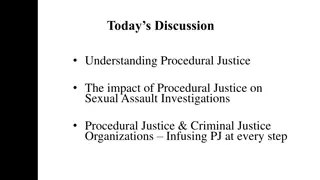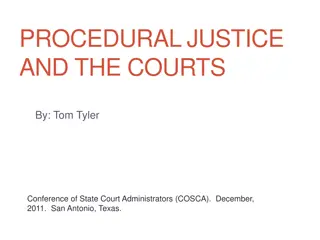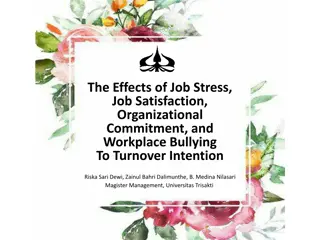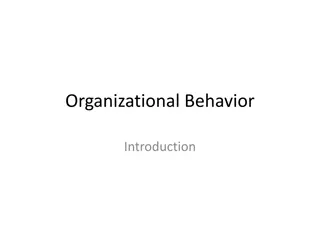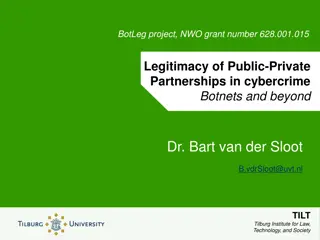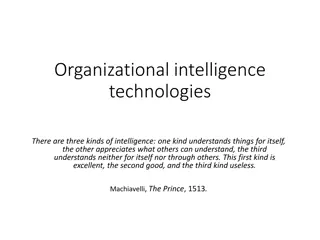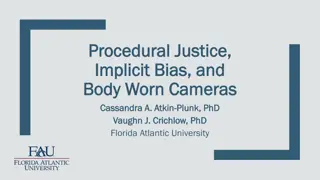Understanding the Role of Managers in Organizational Management and External Environment
Explore the key concepts of organizational management, the role of managers in navigating the external environment, and the impact of external factors on organizational decisions. Learn about micro and macro environments, factors influencing organizations, and strategies for adapting to external cha
2 views • 18 slides
Organizational Basics Certification & Accreditation Procedures in Jeopardy Round
This Jeopardy round focuses on inter-organizational basics certification, fiduciary procedures, working policies, deferred gifts, and guiding principles. Questions range from committees issuing certifications to legal requirements for planned giving and trust services. Dive into the intricacies of o
0 views • 71 slides
Organizational Review and Recommendations for Duluth Airport Authority
This report details an organizational review conducted for the Duluth Airport Authority, focusing on workload, staffing, operations maintenance, and capital improvement projects. The study assesses the current organizational structure, staffing levels, and functional assignments, recommending opport
1 views • 23 slides
Understanding Organizational Concepts and Characteristics
Exploring the essence of organizations, this content delves into the concept, characteristics, and theories of organizational development. It covers the importance of planning, organizational behavior, and the key elements that shape organizations. Highlighting well-defined statutes, work ethics, an
6 views • 9 slides
ORGANIZATIONAL POLITICS
Organizational politics involves informal efforts to influence, align interests, and allocate resources, leading to consequences like stress and decreased performance. Individual and organizational factors play crucial roles in shaping these dynamics.
0 views • 13 slides
Enhancing Organizational Integrity: A Blueprint for Success
Exploring the Integrity Agenda in the context of organizational governance, this content delves into the crucial role of integrity as a cornerstone for building public trust and achieving sustainable success. The discussed core elements highlight the importance of aligning actions with organizationa
0 views • 11 slides
Introduction to Organizational Behavior: Management Theories and Practices
Explore the evolution of organizational behavior from early management theories to contemporary practices. Understand the historical foundations and relevance of management theory in shaping workplace dynamics. Delve into key concepts like Scientific Management, Administrative Management, Bureaucrat
1 views • 28 slides
Conflict Management Strategies in Organizational Behavior
Explore strategies for managing conflict and negotiation in the workplace, including the importance of conflict resolution and crucial conversations. Learn about the history of negotiating techniques within organizational behavior, the definition of conflict, types of conflict, stages of the conflic
2 views • 36 slides
Accessibility Implementation Framework V. 2.0: Organizational Enablement and Strategy
ICT Accessibility is a multifaceted issue requiring technical, organizational, legal, and cultural considerations within an organization. Organizational enablement is key to successfully addressing the complexities of ICT accessibility. The framework emphasizes assessing business needs, defining acc
2 views • 21 slides
Overview of Industrial-Organizational Psychology in the Workplace
Industrial-Organizational (I-O) Psychology focuses on studying behavior and mental processes in work settings, applying psychological principles to enhance work behavior. It covers various specialties such as industrial selection, training, performance measurement, organizational development, motiva
1 views • 33 slides
Understanding Organizational Flexibility in ICS
Explore the concept of organizational flexibility within the standard ICS structure, learning how the modular organization can expand and contract based on incident complexity and size. Delve into the guiding principles of NIMS, the importance of standardization alongside flexibility, and key consid
1 views • 33 slides
Understanding Power and Authority: Exploring Legitimacy Through Works of Lukes and Weber
Diving into the concepts of power and authority, this discussion focuses on the crucial role of legitimacy in distinguishing between the two. Drawing insights from the works of Lukes and Weber, the discourse delves into the dimensions of decision-making, non-decision-making, and shaping desires to i
0 views • 28 slides
Insights into Organizational Culture and Effective Work Practices
Explore the key aspects of organizational culture, the evolution of the social contract in the workplace, characteristics of organizations, indicators of organizational culture, and more. Learn how organizational culture influences behavior, values, and norms within a workplace setting, impacting pe
0 views • 20 slides
Evolution of the Nation-State and Modern State Concepts
The development of the nation-state marks a significant shift in political organization, characterized by centralized power, territoriality, and legitimacy gained through citizen support. Key innovations include territorial demarcation, monopolization of coercion, impersonal power structures, and th
0 views • 8 slides
Financial Management and Fundraising for Organizational Sustainability
Explore the importance of financial management and fundraising in maintaining organizational sustainability and resilience. Dive into topics like budgeting, operations, and accountability to understand how financial sustainability contributes to overall organizational success. Discover insights on o
1 views • 39 slides
Overview of Performance Management Systems and Competency Mapping
Performance Management Systems (PMS) play a crucial role in ensuring organizational objectives are met through individual contributions. This entails continuous improvement at all levels - individual, team, and organizational. Managing performance is vital for survival and growth in a competitive en
3 views • 45 slides
Understanding Legitimacy in Family Law
Legitimacy in family law refers to the status acquired by a person born in lawful wedlock, as opposed to illegitimacy where a child is born out of wedlock. Legitimation is the process through which an illegitimate child gains legitimate status. In Nigeria, customary law also recognizes legitimacy ba
0 views • 22 slides
Understanding Organizational Behavior and Characteristics
Organizational behavior explores how individuals behave in various contexts such as child, IPS officer, businessman, etc. An organization is a consciously coordinated unit comprising two or more individuals working towards common goals. Characteristics of an organization include deliberate creation,
2 views • 41 slides
Understanding Perception in Organizational Behavior
Perception, as the process of interpreting sensory information, plays a crucial role in individual behavior within organizations. This article delves into the basics of perception, highlighting its impact on how individuals view reality, receive information, and make interpretations. It also explore
1 views • 14 slides
Understanding Organizational Structure and Vertical/Horizontal Linkages
Organizational structure encompasses formal reporting relationships, department grouping, and system design for effectiveness. By structuring for efficiency, organizations prioritize vertical communication and centralized decision-making. In contrast, a learning structure emphasizes horizontal commu
0 views • 30 slides
Understanding Operations Management and Organizational Functions
Operations Management involves creating value through the transformation of inputs into goods and services. Essential organizational functions like marketing, production, finance, and accounting contribute to the efficient production of goods and services. Various industries utilize organizational c
0 views • 41 slides
Understanding Organizational Development: Key Concepts and Practices
Explore the world of Organizational Development (OD) through this comprehensive guide covering what OD entails, its significance in practice, the relationship between Human Resource Development (HRD) and OD, roles of OD practitioners, and essential frameworks and processes involved. Gain insights in
0 views • 66 slides
Understanding Organizational Development Interventions
Organizational Development (OD) Interventions play a crucial role in enhancing organizational functioning and aiding managers in navigating team dynamics. These interventions encompass various techniques, including behavioral and non-behavioral approaches such as Sensitivity Training, Transactional
4 views • 17 slides
Organizational and Managerial Issues in Logistics
This chapter delves into various organizational and managerial issues in logistics, covering topics such as organizational structure, productivity, quality, theft management, logistics social responsibility, reverse logistics, and programs to counter terrorism impact on logistics. Key terms and conc
0 views • 37 slides
Understanding Public Sector Performance Audit in Canada and Denmark
The study explores the legitimacy and apoliticality of Performance Auditing (PA) in Canada and Denmark, focusing on how Supreme Audit Institutions (SAIs) maintain political neutrality and legitimacy. Existing knowledge points to the inherent political nature of PA and the challenges SAIs face in pre
4 views • 9 slides
Developing Vision and Goals for Personal and Organizational Growth
Explore the importance of visionary leadership in developing a clear vision and goals for personal and organizational success. Understand how vision defines the desired future state, sets the direction, and separates leaders from followers. Learn the significance of aligning personal vision with org
1 views • 21 slides
Illegitimate Debts and the Asian Development Bank: The Philippine Case Overview
The Philippine government's debt situation is outlined, highlighting the importance of a historical audit to determine the legitimacy of foreign loans. The General Appropriations Act of 2017 calls for a debt audit on specific projects. The audit aims to ascertain the legitimacy of contracted loans a
0 views • 15 slides
Evolution of Organizational Forms in Historical Perspective
The study delves into the evolution of organizational structures through the lens of transaction cost economics (TCE) and historical legacies, analyzing the transition from putting-out systems to inside contracting. It highlights the challenges of monitoring, shirking, and transaction costs faced by
0 views • 13 slides
Program Sustainability Framework and Implementation Strategies
Developing a conceptual framework to assess the sustainability of a simulation program involves identifying key components, areas for assistance, and support needed. Focus areas include organizational buy-in, faculty development, curriculum integration, and overcoming barriers to simulation. Incorpo
0 views • 23 slides
Establishing Collaborative Organizational Culture in Schools
Cultivating a culture of collaboration is essential in educational settings to enhance teamwork, decision-making, and goal achievement. Organizational culture encompasses shared attitudes, values, and practices that shape behaviors. Dysfunctional cultures hinder progress, while types of organization
0 views • 33 slides
Understanding Organizational Culture and Its Impact on Business Success
Organizational culture encompasses shared beliefs, values, and behaviors within a company. It influences goal-setting, strategies, and employee actions. The transmission of culture is vital for aligning values with business practices. Culture matters for client relations, differentiation, and managi
0 views • 17 slides
Understanding Democracy, Accountability, and the Role of Parliaments
Explore the concepts of democracy, accountability, and the significance of parliaments in ensuring government transparency and citizen participation. Learn how factors like political culture, institutions, and legitimacy impact the durability of democratic systems. Discover the link between democrac
0 views • 24 slides
Nonprofit Leadership Transitions for Organizational Sustainability: An Updated Approach
Explore the evolving landscape of nonprofit leadership transitions and organizational sustainability with a focus on the executive search and transition process. Learn about the importance of leader development, organizational sustainability, and how to navigate inevitable transitions in a changing
0 views • 12 slides
Understanding Procedural Justice and Its Impact on Criminal Justice Organizations
Procedural justice emphasizes fairness, respect, and transparency in decision-making processes. This approach can lead to positive organizational changes, improved community relationships, and increased trust and legitimacy. The four pillars of procedural justice include fairness in rule application
0 views • 12 slides
Understanding Procedural Justice and Public Trust in the Justice System
The discussion delves into the goals of the justice system, the importance of public trust and confidence, and the concept of legitimacy in the context of the courts. Despite improvements in the delivery of justice, trust and confidence among Americans, especially in minority groups, remain a challe
0 views • 39 slides
Effects of Job Stress, Job Satisfaction, Organizational Commitment, and Workplace Bullying on Turnover Intention
The research examines the impact of job stress, job satisfaction, organizational commitment, and workplace bullying on turnover intention in a competitive insurance company. High turnover rates can hinder organizational performance and goal achievement. Preliminary survey data at PT Prudential (2017
0 views • 9 slides
Understanding Organizational Behavior and Individual Behavior
Organizational Behavior (OB) is a multidisciplinary field that combines knowledge from various disciplines to study and manage organizations effectively. It emphasizes the application of this knowledge to enhance organizational effectiveness and the well-being of participants. OB is a useful concept
0 views • 38 slides
Exploring Legitimacy and Public-Private Partnerships in Cybercrime Enforcement
Investigate the legitimacy of public-private partnerships in addressing cybercrime, focusing on botnets and related issues. The study examines the classic model of legitimacy involving the state, citizens, and the market, and explores different stakeholders' roles in ensuring legitimacy in enforceme
0 views • 14 slides
Understanding Organizational Intelligence Technologies
Organizational intelligence technologies involve three kinds of intelligence - understanding independently, appreciating what others can understand, and understanding neither for itself nor through others. This concept emphasizes the importance of collecting, storing, processing, and interpreting da
0 views • 47 slides
Understanding Procedural Justice, Implicit Bias, and Body Worn Cameras
This content covers the concepts of procedural justice, implicit bias, and body-worn cameras in the context of law enforcement. It explores the importance of procedural justice, strategies for enhancing it, and its significance in policing, with a focus on fairness and legitimacy. The images provide
0 views • 38 slides


